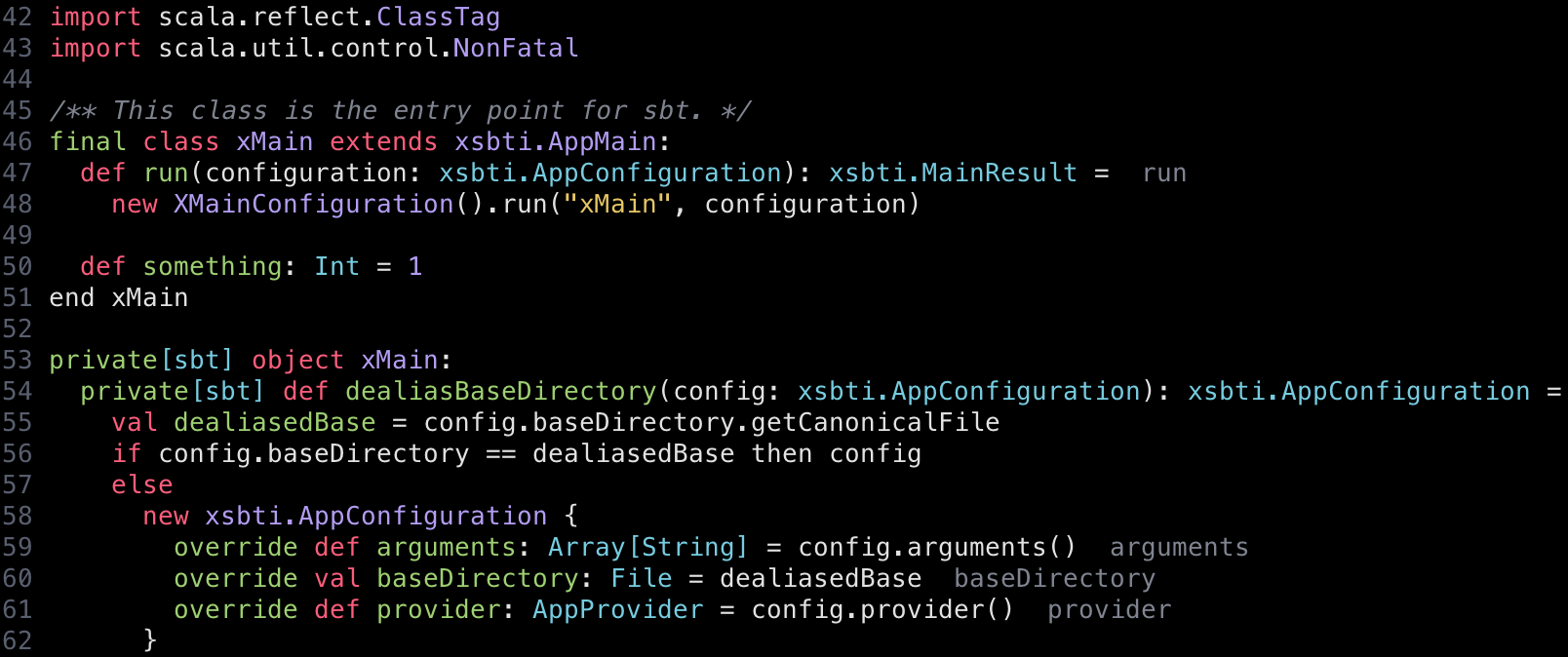Jar Jar Abrams 1.9.0 and sbt-assembly 2.1.3
Jar jar Abrams 1.9.0 and sbt-assembly 2.1.3 are released with security vulnerability fixes.
Jar Jar Abrams is an experimental extension to Jar Jar Links, intended to shade Scala libraries.
Jar jar Abrams 1.9.0 and sbt-assembly 2.1.3 are released with security vulnerability fixes.
Jar Jar Abrams is an experimental extension to Jar Jar Links, intended to shade Scala libraries.
Hi everyone. On behalf of the sbt project, I’m happy to announce sbt 1.9.6 patch release is available. Full release note is here - https://github.com/sbt/sbt/releases/tag/v1.9.6
See 1.9.0 release note for the details on 1.9.x features.
Update: ⚠️ sbt 1.9.5 is broken, because it causes Scala compiler to generate wrong class names for anonymous class on lambda. Please refrain from publishing libraries with it while we investigate. See cala/bug#12868 for details.
Hi everyone. On behalf of the sbt project, I’m happy to announce sbt 1.9.5 patch release is available. Full release note is here - https://github.com/sbt/sbt/releases/tag/v1.9.5
See 1.9.0 release note for the details on 1.9.x features.
-X is passed to scalacOptions zinc#1246 by @unkarjedyHi everyone. On behalf of the sbt project, I’m happy to announce sbt 1.9.4 patch release is available. Full release note is here - https://github.com/sbt/sbt/releases/tag/v1.9.4
See 1.9.0 release note for the details on 1.9.x features.
Hi everyone. On behalf of the tree-sitter-scala project, I am happy to announce tree-sitter-scala 0.20.2. The first two segments of the version number comes from the tree-sitter-cli that was used to generate the parser, and the last segment is our actual version number.
tree-sitter-scala is a Scala parser in C language, generated using Tree-sitter CLI, and conforming to the Tree-sitter API. Tree-sitter parsers are generally fast, incremental, and robust (ok with partial errors).
Hi everyone. On behalf of the sbt project, I’m happy to announce sbt 1.9.3 patch release is available. Full release note is here - https://github.com/sbt/sbt/releases/tag/v1.9.3
See 1.9.0 release note for the details on 1.9.x features.
As a code base becomes larger, it’s useful to have language tooling that can perform automatic refactoring. Thankfully, in 2016 Scala Center created Scalafix. In the announcement blog post Ólafur Geirsson wrote:
Scalafix takes care of easy, repetitive and tedious code transformations so you can focus on the changes that truly deserve your attention. In a nutshell, scalafix reads a source file, transforms usage of unsupported features into newer alternatives, and writes the final result back to the original source file.
Hi everyone. On behalf of the sbt project, I’m happy to announce sbt 1.9.2 patch release is available. Full release note is here - https://github.com/sbt/sbt/releases/tag/v1.9.2
See 1.9.0 release note for the details on 1.9.x features.
Hi everyone. On behalf of the sbt project, I’m happy to announce sbt 1.9.1 patch release is available. Full release note is here - https://github.com/sbt/sbt/releases/tag/v1.9.1
See 1.9.0 release note for the details on 1.9.x features.
Hi everyone. On behalf of the tree-sitter-scala project, I am happy to announce tree-sitter-scala 0.20.1. The first two segment of the version number comes from the tree-sitter-cli that was used to generate the parser, and the last segment is our actual version number.
tree-sitter-scala is a Scala parser in C language, generated using Tree-sitter CLI, and conforming to the Tree-sitter API. Tree-sitter parsers are generally fast, incremental, and robust (ok with partial errors).
Hi everyone. On behalf of the sbt project, I am happy to announce sbt 1.9.0. This is the nineth feature release of sbt 1.x, a binary compatible release focusing on new features. sbt 1.x is released under Semantic Versioning, and the plugins are expected to work throughout the 1.x series. Please try it out, and report any issues you might come across.
The headline features of sbt 1.9.0 are:
sbt new, a text-based adventurereleaseNotesURL settingIntegrationTest configurationHi everyone. On behalf of the tree-sitter-scala project, I am happy to announce tree-sitter-scala 0.20.0. The first two segment of the version number comes from the tree-sitter-cli that was used to generate the parser, and the last segment is our actual version number.
tree-sitter-scala is a Scala parser in C language, generated using Tree-sitter CLI, and conforming to the Tree-sitter API. Tree-sitter parsers are generally fast, incremental, and robust (ok with partial errors).
Hi everyone. On behalf of the sbt project, I am happy to announce sbt 1.9.0-RC2. This is the nineth feature release of sbt 1.x, a binary compatible release focusing on new features. sbt 1.x is released under Semantic Versioning, and the plugins are expected to work throughout the 1.x series. Please try it out, and report any issues you might come across.
The headline features of sbt 1.9.0 are:
sbt new, a text-based adventurereleaseNotesURL settingIntegrationTest configurationHi everyone. On behalf of the sbt project, I’m happy to announce sbt 1.8.3 patch release fixing a security vulnerability. Full release note is here - https://github.com/sbt/sbt/releases/tag/v1.8.3
See 1.8.0 release note for the details on 1.8.x features.
A two-day virtual/Tokyo hybrid ScalaMatsuri took place this weekend. Thanks to all the presenters, sponsors, and participants.
Lots of bumps and mishaps for sure, but hopefully it was a successful conference. I join as one of 16 ScalaMatsuri organizers, and also gave a talk and an open-mic session as well.
In sbt 2.0 ideas I wrote:
idea 3-A: limit dependency configuration to
CompileandTestHere are some more ideas to simplify sbt. sbt generally allows creating of custom dependency configuration, but it doesn’t work well. For the most part, anything that requires custom configuration should likely be handled using separate subproject instead.
Dependency configuration, such as Compile, Test etc, is a notion directly imported from Apache Ivy’s configuration, which allows custom configurations and extends-relationship among them. The shift in sbt 0.9 embraced configuration and enabled code reuse via inConfig(...)(...). However, generally the custom configuration often requires reimplementation of all tasks, and thus the complete knowledge of the internals.
There are various technical decisions around sbt and Zinc that impact the Scala ecosystem, but currently the process of adding new features or changes to existing feature is not well defined. For the most part, the contributors like Scala Center and I come up with ideas and execute them.
At the Tooling Summit in Lausanne this week, Iulian Dragos suggested we adopt “a lightweight process based on RFC (request for comments) docs that can serve as a design document.” In general, it would be a good idea to capture motivations and design intent of major changes.
In sbt 2.0 ideas I wrote:
idea 6: more disk cache and remote cache
Extending the idea of cached compilation in sbt 1.4.0, we should generalize the mechanism so any task can participate in the remote caching.
Here are some more concrete ideas for caching.
To summarize the general problem space, currently setting up disk caching for tasks is a manual work, so it’s under-utilized. Remote caching is limited to cached compilation.
It’s spring time, and spring makes us hopeful. I’ll be attending Tooling Summit next week, so I think this would be a good time to gather my toughts around sbt 2.
Bazel generally prefers monoversioning, in which all targets in the monorepo uses the same version given any library (JUnit or Pandas). Monoversioning greatly reduces the version conflict concerns within the monorepo, and in return enables better code reuse. In practice, monoversioning has a drawback of tying everyone at the hip. If service A, B, C, D, etc are all using Big Framework 1.1, it becomes costly to migrate all to Big Framework 1.2 if there might be a regression. Years would go by, and Big Framework 2.0 might come out, and again, it would be too risky.
Jar jar Abrams 1.8.2 and sbt-assembly 2.1.1 are released.
Jar Jar Abrams is an experimental extension to Jar Jar Links, intended to shade Scala libraries.
Released scalaxb 1.9.1 with Scala 3 support contributed by @fthomas.
Hi everyone. On behalf of the sbt project, I’m happy to announce sbt 1.8.2 patch release fixing a few regressions found in sbt 1.8.1. Full release note is here - https://github.com/sbt/sbt/releases/tag/v1.8.2
See 1.8.0 release note for the details on 1.8.x features.
Happy new year! On behalf of the sbt project, I’m happy to announce sbt 1.8.1 patch release is available. Full release note is here - https://github.com/sbt/sbt/releases/tag/v1.8.1
See 1.8.0 release note for the details on 1.8.x features.
The economic cycle seems to come and go like a slow tide, and sometimes the tech companies also get caught in the middle. Fortunately, Scala seems to be used by some of the leading companies, and although I’ve started using Scala and have been contributing the community mostly for the pure joy of it, time and time again when I was in a bind the Scala community has helped me back by giving me encouragements and career opportunities. I resigned Twitter about a month ago, but I will be more than ok :)


4h9m